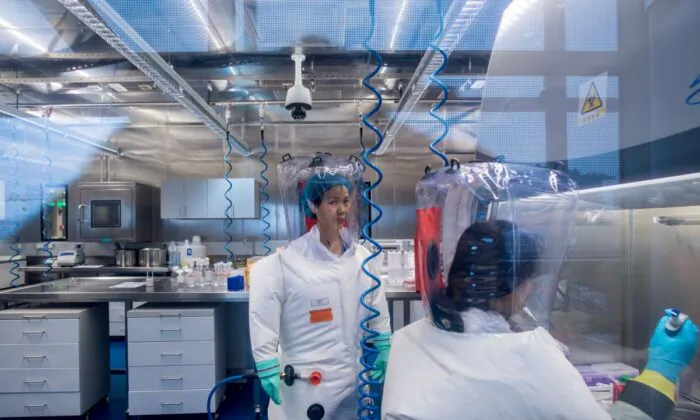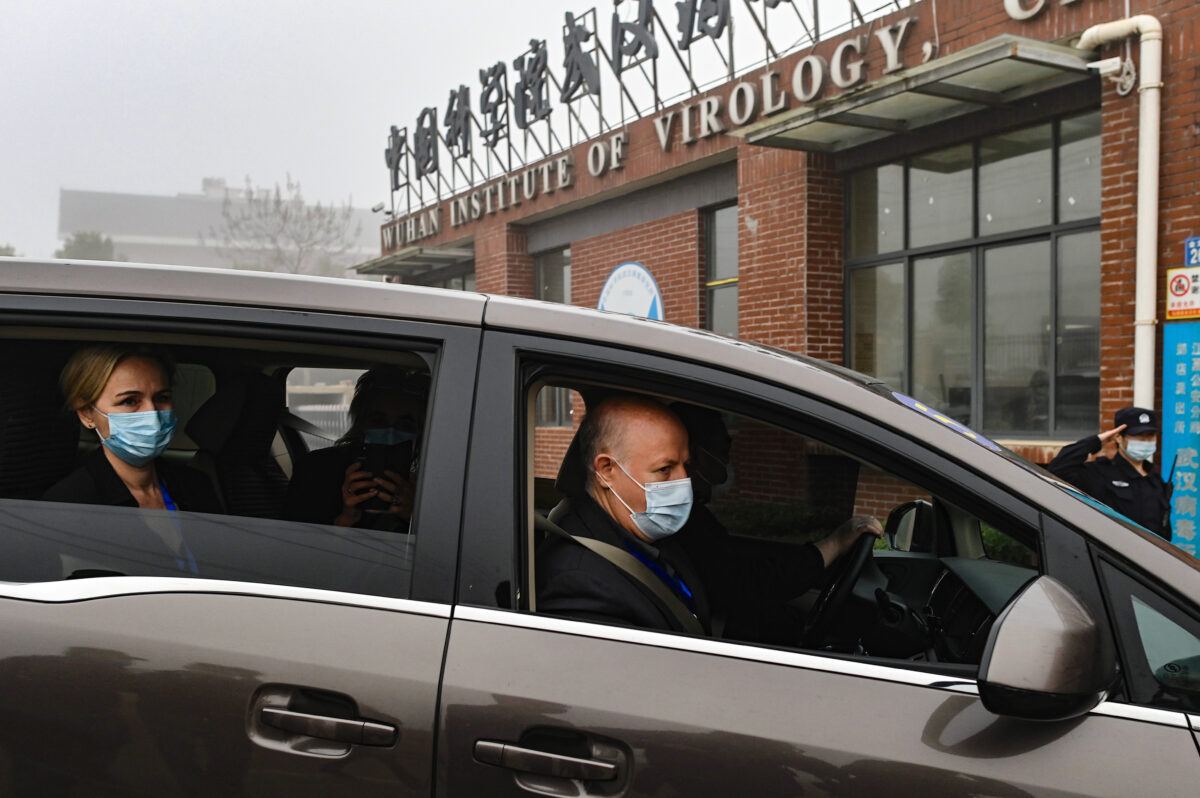
Commentary
Since the outbreak of the COVID-19 pandemic, exactly what happened at the Wuhan Institute of Virology (WIV) remains a mystery, but there is a growing suspicion that the virus likely originated in the institute’s P4 lab. Meanwhile, three women who are connected to the WIV have become the focus of discussions in recent years.
Experts say the three female scientists may hold the key to the mystery. Their roles in the months prior to and immediately after the pandemic began were very different, but each may be significant in tracing the virus’s origins.
The Director
Wang Yanyi, born in 1981, is the director of the Wuhan Institute of Virology. In 2000, she was admitted to the School of Life Sciences at Peking University as an art student, but switched to science and earned a bachelor’s degree in life sciences in 2004.
Wang was praised in the media for integrating art and science, however, critics dubbed her a pampered “post 80’s queen” (a colloquial term for those who grew up under China’s one-child policy). It is notable that in the Chinese academic system, students with art or sports talents are sometimes accepted into universities despite falling short of admission requirements.
It was at Peking University that Wang met her future husband, Shu Hongbing, a professor at the university’s school of life sciences. Despite a 14-year age difference, the teacher-student pair fell in love. When Shu became an assistant professor at the University of Colorado’s department of immunology, Wang followed him there and obtained her master’s degree in immunology from the University of Colorado School of Medicine in 2006.
In 2005, Shu became dean of the school of life sciences at the University of Wuhan. Once again, Wang followed him, returning to China and obtaining her Ph.D. in microbiology from the University of Wuhan in 2010.
Five months after receiving her Ph.D., she became an associate professor at the university’s school of life sciences. Not long after, her husband was appointed to the Chinese Academy of Sciences.
In October 2018, the 37-year-old Wang was appointed director of the WIV. The appointment was unusual: she was young, and her working experience did not appear to qualify her for the prestigious position. Although her husband was now a member of the Chinese Academy of Sciences, his personal influence alone would not have been able to secure the position for her, say insiders.
Both Wang and her husband were active politically. Although not communist party cadres, both were involved in the China Zhigong party—one of eight minority “puppet” parties legally recognized in China.
The ‘Shanghai Gang’ Connection
In an interview with The Epoch Times, U.S.-based China expert Li Yanming speculated that Wang’s unusual appointment as WIV director can actually be traced to political maneuvering.
Li’s source is an insider familiar with Chinese politics, who goes by the pseudonym “Mr. K.” According to Mr. K., the “Shanghai Gang”—a political faction loyal to former Chinese dictator and Xi Jinping rival Jiang Zemin—is behind Wang’s appointment.
The “Shanghai gang” is thought to be tightly controlled by Jiang’s eldest son, Jiang Mianheng.
In addition to being influential in business and politics, Jiang Mianheng is a scientist with a strong interest in biological warfare. As a member of the Chinese Academy of Sciences, he was in charge of research and development for top-tier research institutions. He controlled major research projects and allocated huge amounts of funds to the biological field.
According to Mr. K., both Wang and her husband had close ties to Jiang Mianheng; not surprising given their fields of study and his interest in biological research.
Mr. K. speculated that Wang and Shu owed their appointments to Jiang’s influence with powerful members of the Chinese Academy of Sciences. Their positions at the University of Wuhan and the WIV allowed Jiang to control vital military research, he said.
According to a press statement on Jan. 15, 2021, by former Secretary of State Mike Pompeo, “the WIV has engaged in classified research, including laboratory animal experiments, on behalf of the Chinese military since at least 2017.”
‘Bat Woman’
At the time that the much younger Wang became director, 54-year-old virologist Shi Zhengli had been working at the WIV for 28 years.
Nicknamed “Bat Woman” for her extensive research on bats, she was a leading scientist in the field of coronaviruses, with a long list of academic papers and titles to her name.
In 2018, Shi was appointed deputy director of the institute, which had just opened China’s first biosafety level 4 lab (P4 lab). The lab quickly became a repository of the most deadly viruses known to mankind.
At the end of 2019, the sudden outbreak of COVID-19 in Wuhan brought Shi and the WIV to the focus of global attention. Rumors spread that the outbreak had originated from a leak at the institute.
A multinational intelligence-sharing coalition theorized that the coronavirus could have escaped from Shi’s lab, citing faulty security protocols.
Shi admitted she had endured several sleepless nights after the outbreak. “Could they have come from our lab?” she asked herself, according to a profile in Scientific American.
 Peter Daszak (R) and other members of the World Health Organization (WHO) team investigating the origins of the COVID-19 coronavirus arrive at the Wuhan Institute of Virology on Feb. 3, 2021. (Hector Retamal/AFP via Getty Images)‘Permission to Trigger a Pandemic’
Peter Daszak (R) and other members of the World Health Organization (WHO) team investigating the origins of the COVID-19 coronavirus arrive at the Wuhan Institute of Virology on Feb. 3, 2021. (Hector Retamal/AFP via Getty Images)‘Permission to Trigger a Pandemic’
Inevitably, the unusual chain of authority at the WIV led to rumors about possible mismanagement, which in turn may have triggered a lab leak. One Chinese news portal, as early as February 2020, cited “continuous personnel infighting and chaotic internal management of the virus, so that someone intentionally or unintentionally spread the epidemic to the society.”
Despite the widespread speculation, a World Health Organization report, released in March 2020, concluded it was “extremely unlikely” that the viral pandemic could have been caused by a lab accident. WIV director Wang told NBC News in August 2020 that the allegations were “completely untrue” and complained the lab had been “targeted as a scapegoat for the origin of the virus.”
However, a Feb. 28, 2023 article by U.S. public health watchdog Right to Know gave credence to the original claims. According to a U.S. State Department cable (pdf) obtained by Right to Know, despite the presence of a P4 lab at the WIV, Shi was denied permission to use the high-containment lab for high-risk research such as that involving SARS. The cable also noted a “shortage of appropriately trained technicians and investigators needed to safely operate this high containment laboratory.”
“Denying permission to elevate containment for high-risk research is dangerously close to granting permission to trigger a pandemic,” Richard Ebright, a molecular biologist at Rutgers University, told Right to Know.
‘Wolf Warrior’
In January 2020, during the early stages of the outbreak, Chinese military biochemist Chen Wei and her team were dispatched to Wuhan. There were also reports that she took over the supervision of the WIV.
Chen Wei, 57, is an expert in biological warfare defense, with the rank of major general. She has long been involved in dangerous biological research, such as collecting virus samples after the SARS and Ebola outbreaks.
Chen acquired the nickname “Wolf Warrior” after her work with Ebola vaccines drew comparisons to a movie hero who developed a vaccine to combat a deadly African virus.
The official reason why Chen was dispatched to Wuhan in late January 2020 was to create a vaccine to counter the COVID-19 virus. Her team successfully developed the first COVID-19 vaccine, called Ad5-nCoV, for initial use in military personnel before large-scale testing.
However, according to an Oct. 28, 2022 article by nonprofit news source Pro Publica, written in conjunction with Vanity Fair, the rapid speed with which Chen’s team developed the vaccine “seemed unrealistic, if not impossible” and was evidence that the WIV had already been working with the virus that caused the pandemic.
Experts consulted by the publications said the rapid development suggested that the team “must have had access to the genomic sequence of the virus no later than in November 2019, weeks before China’s official recognition that the virus was circulating.”
Mr. K. agreed that Chen’s presence at the WIV was evidence for the lab leak theory. He said that Chen was most likely sent to Wuhan to “clean up the mess” and to investigate the institute’s role in the outbreak.
Radio Silence
Official reports and discussions increasingly point to a lab leak as the most likely source of the virus that killed millions worldwide. What role, if any, each of these scientists played in the drama is still unclear.
What is certain is that the three women, despite being at the center of the controversy, are remaining silent on the subject. Despite being somewhat of a media darling, Shi’s most recent interview with Western media was at least a year ago. Chen, praised as a hero for leading the vaccine effort, was last heard from in February of 2021. Meanwhile, Wang, who is the public face of the WIV, has been silent since the Aug. 10, 2020 interview with NBC news in which she said that the institute had a “100 percent safety record.”
In the U.S. Congress, the House Select Subcommittee on the Coronavirus Pandemic has requested in-person, transcribed interviews with both Shi Zhengli and Chen Wei. In April, the Chinese embassy expressed “firm opposition” and “grave concern” about this proposal.
Views expressed in this article are the opinions of the author and do not necessarily reflect the views of The Epoch Times.